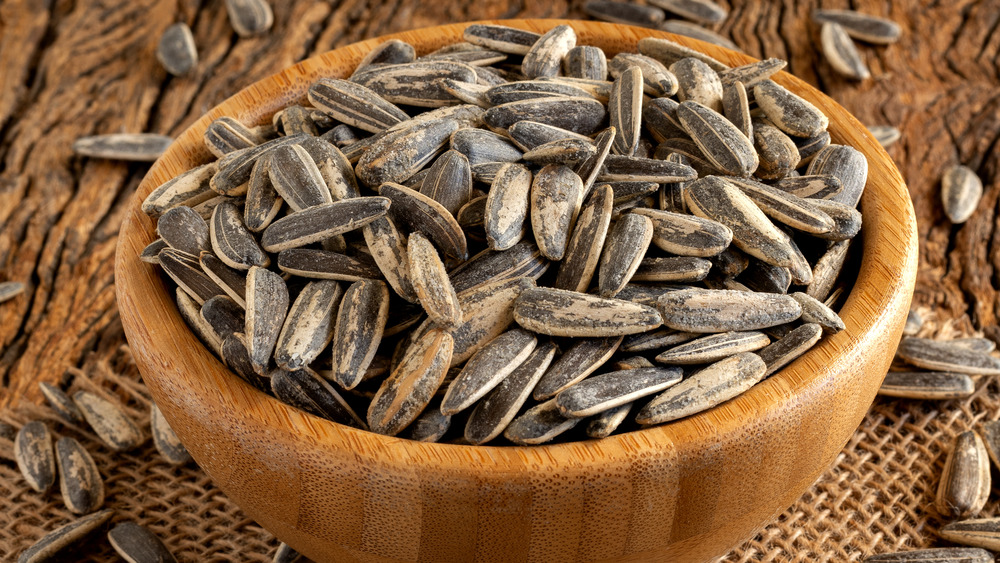You Could Be Ruining Your Mood If You Eat These Foods
Is it possible to ruin your mood by eating certain foods? It may seem far-fetched, but you've surely heard the saying "you are what you eat." And you probably already know that what food you put in your body can have a very physical effects on you. It stands to reason that the things you eat could also impact your mental health. That's right: You are, and you feel, what you eat.
While some foods can make you feel happy, relaxed, riled up, and even sexually charged, others may deplete you of your energy, bring you down, and even lower your libido. This means that foods can exacerbate how you already feel, too. If you're already feeling bummed out, you probably don't want to eat something that'll only make matters worse. And, if you're feeling good, you equally don't want to eat something that'll kill your buzz. So be mindful of what you eat, because it really can be a doozy on your state of mind. Curious what you should — and shouldn't — be consuming given your current mental state? Here are some foods that can significantly affect your mood.
Red meat could take you out of the mood
Every omnivore loves a good ole steak night. A juicy medium-rare sirloin steak drizzled in a flavorful chimichurri sauce? Honestly, there's nothing better. But you should watch how much red meat (beef, pork, and lamb) you eat, particularly if you're sexually active.
Not only does red meat have more saturated (unhealthy) fat than chicken, fish, and veggie proteins, which can take a toll on your health (hello, heart disease), according to the American Heart Association, but red meat can also kill your sex drive. Double whammy.
"Interestingly, some red meats can contain added hormones or antibiotics, which can unbalance a man's natural hormone levels if eaten in large quantities," Frida Harju, a nutritionist at the health and fitness app Lifesum, told Cosmopolitan. Instead, she recommends opting for a "leaner cut like a classic filet mignon, for a healthy and balanced diet that will not wreak havoc with your libido." In addition to killing your sex drive, "meat consumption may be associated with a moderately higher risk of depression," a 2017 study in BMC Psychiatry found. Yes, that steak may just take you out of the mood and ruin your mood.
Pasta might make you sleepy and irritable
Who doesn't love a big bowl pasta? Pesto gnocchi. Penne vodka. Classic spaghetti in tomato sauce. Pasta primavera. Carbonara. The list goes on and on. Pair it with some fluffy bread and butter, and it's like heaven on earth. Italian food is just so soothing. But, like a comforting hug, it feels great for a while — until it overwhelms you.
Thanks to the carbs in pasta, it also wipes you out. That's right, pasta will likely have you feeling sleepy in no time. Ever go to grandma's house and be force-fed so much pasta that you end up pretty much falling asleep at the table? Yeah, well, there's actual science behind this phenomenon.
"Eating refined carbohydrates like pasta can cause a rise in blood sugar, followed by a plunge in insulin levels, which can cause fatigue and weakness," Dr. Pamela Peeke, physician and author of The Hunger Fix: The Three-Stage Hunger and Recovery Plan for Overeating and Food Addiction, told HuffPost. The same is true for the white bread. "[The] high flour and sugar content will bring on drowsiness," Peeke continued. And according to Sanford Health, a blood sugar crash can also leave you feeling irritable.
All the sugar in candies could be depressing you
We're sure you already know why you shouldn't indulge in too much candy. For one, it can ruin your teeth — the harmful bacteria in your mouth feeds off sugar and creates an acid that erodes the enamel on your teeth, according to May Family Dental. Oh, and eating too much added sugar, like that which is found in candy, actually increases your risk of dying from heart disease, according to Harvard Health Blog. But not only is candy bad for your physical health, it can also take a toll on your mental health.
According to Healthline, the sugar in candy could be depressing you. In fact, according to a 2017 study published in Scientific Reports, men who eat 67 grams of sugar or more per day are 23 percent more likely to be depressed after five years. That's for a few reasons. Sugar is actually more addicting than cocaine, according to a study published in the journal PLOS One. As with all addictions, the highs are high, but the lows are very low. Additionally, sugar has been linked to inflammation, which is linked to depression, according to a study published in Current Psychiatry.
Eat fried foods and you might become moody and aggressive
We get it: Fried food is the bomb. You can fry pretty much anything and make it taste that much better. Potatoes (hey, french fries, what's up?). Chicken. Zucchini. Even Oreos. Like, have you ever tried a fried Oreo? Despite how delicious these foods can be, you should monitor your intake. Consuming too many can make you more likely to become aggressive, according to research (via Scientific American). This seems to come down to the many trans fats in fried foods. How is this possible? Trans fats disrupt the chemical process of converting fatty acids into docosahexaenoic acid (DHA), which makes up part of the brain.
"Trans-fatty acids were a more consistent predictor of aggression than some traditional risk factors such as age, male sex, education, and smoking," Beatrice Golomb, the study's author, physician, and associate professor of medicine at the University of California, San Diego, told Scientific American. "The findings were consistent across both sexes and across all ages, ethnicities, and socioeconomic groups."
Processed seeds could be putting a damper on your day
Seeds are generally considered healthy — and they are indeed good for you in so many ways! Seeds are an awesome source of fiber, and they contain monounsaturated and polyunsaturated fats (aka healthy fats) as well as key vitamins, minerals, and antioxidants that your body needs (via Healthline). However, when they're processed, they can have some negative effects on your mood.
"While a great choice when consumed raw or roasted yourself, the processed versions are often coated in a preservative called potassium bromate, which blocks iodine from being absorbed by the thyroid," Kelly Boyer, founder and CEO of the meal delivery service Paleta, told Eat This, Not That. "When your thyroid can't function properly, you may not be able to either. Psychiatrists often check their patients' thyroid levels when dealing with depression." Beyond the possible link to depression, processed seeds tend to be loaded with sodium and other additives, according to Boyer. So you should steer clear of the processed variety.
Salted peanuts could be the culprit of your moodiness
Salted nuts taste delicious — there's something about the dash of salt and the crunch that just works so well. Whether you choose peanuts, cashews, almonds, or a mix of them all, they're an easy, filling snack. And nuts are good for you too. Generally speaking, they are a pretty darn reliable source of healthy fats, fiber, and protein, according to Healthline. But all that salt is not so good for you.
Nancy Cook, a professor of medicine at Harvard Medical School, told Harvard Women's Health Watch there's a pretty undisputed link between higher sodium intake and both higher blood pressure and an increased risk of cardiovascular disease. Nevertheless, most Americans eat too much salt — sometimes on nuts like peanuts. And these salted peanuts may be contributing to your moodiness.
"Most peanuts you buy at the store contain high amounts of sodium and often a food additive called MSG, which is an artificial flavoring that leaves one feeling depressed, weak, fatigued, and often moody or with headaches," celebrity nutritionist and health consultant Mikaela Reuben told Eat This, Not That.
Margarine might be making you have mood swings
Margarine can make a lot of foods taste better. Toast, pasta, sweet potatoes, muffins, pancakes — and a whole lot more. You can slather your foods in margarine as opposed to butter, but that won't make them healthier. Although the use of artificial trans fats (above 0.5 grams per serving) were banned by the Food and Drug Administration in 2015, some trans fats continue to linger in certain products (via Mayo Clinic). "Some margarines contain trans fat," registered Katherine Zeratsky explained in a 2020 article for the Mayo Clinic. "In general, the more solid the margarine, the more trans fat it contains." This means sticks of margarines contain more than the tub variety.
"Margarine contains high amounts of processed saturated fats, which are very different from the fat in healthy options such as olive oil, nuts, or avocado," celebrity nutritionist and health consultant Mikaela Reuben told Eat This, Not That. "The consumption of margarine can cause an imbalance in blood sugar, leading to rapid mood swings and weight gain."
A daily bowl of breakfast cereal may be worsening your depression
Breakfast cereal is as old as time — well, at least as old as the 19th century. Cereal is such a basic, quick-and-easy breakfast staple; all you need is some milk of any kind. And there are all different types of cereals from which to choose — some are certainly healthier for you than others (we're looking at you Count Chocula). Unfortunately, while many cereal boxes are full of bold claims of being super good for you, most cereals aren't all they're cracked up to be. According to Healthline, many types of cereals don't actually give you that all-day energy they promise.
Why is this? Well, it turns out that most breakfast cereals don't contain nearly as much fiber as they do added sugars. In fact, sugars make up almost half of all the carbs in many popular breakfast cereals. And this combination of low fiber and high sugar can spike your blood sugar and insulin levels. This means that you may get a boost of energy, but you will also get a crash. And this daily "roller coaster of high blood sugar followed by a crash may accentuate the symptoms of mood disorders [like depression]," physician David Sack explained in an article for Psychology Today.
Bacon may take a toll on your cognitive functioning
Ah, bacon. It tastes as good as it smells, doesn't it? But, sadly, it doesn't feel as good as it tastes or smells. Registered dietitian Keri Gans told The Daily Meal that bacon can wreak havoc on your overall cognitive functioning and, particularly, your memory. The more bacon you eat, the more forgetful you could become.
"As much as you might enjoy bacon, any more than one slice at a time could affect your memory," she said. "Supposedly, consuming more than four grams in a hour of saturated fat can raise the bad cholesterol in your blood and cause inflammation of your brain neurons. A four-ounce serving of bacon can have as much as 15.5 grams of saturated fat."
One study also found that eating bacon could trigger manic episodes or bipolar disorder. "Our results suggest that nitrated cured meat could be one environmental player in mediating mania," Professor Robert Yolken, lead author of the study, told Plymouth Live. While you can go ahead, wake up and smell the bacon. Just don't eat too much of it. We know, we know, this is far easier said than done.
If you're sensitive to gluten, that morning bagel could lead to anxiety and depression
Bagels (especially the ones from New York and New Jersey) are pure bliss. Something about the crisp outside and the warm, fluffy inside just does things to you. But do you know what bagels are full of? Gluten. And do you know what gluten does to your body? For those sensitive to it, it does some very not nice things. In such individuals, gluten triggers an immune response that takes a toll on the lining of your small intestine, according to Harvard Health Blog. This can lead to a whole host of health problems beyond bloating you and making your stomach hurt, including nerve damage, osteoporosis, infertility, and seizures.
One study found that gluten, such as the gluten found in bagels, can lead to serious mood disorders in those with "gluten-related disorders," like celiac disease. So while a bagel might make you feel all well and good in the moment, you might not be so happy down the line.
Potato chips could be the reason you've been feeling down
Potato chips. They're so gosh darn addicting. You can never just eat a few — or even a handful. It's like once you open the bag, something compels you to just eat the whole thing. The whole thing. Even pouring the crumbs in your mouth. Of course, potato chips aren't healthy. That's no secret. But did you know that they could be contributing to your bad mood? Yes, as it turns out, eating too many potato chips could be why you're feeling so down or anxious.
Potato chips contain a lot of sodium, nutritional anthropologist Sasha DeBeausset explained in an article for Pain Resource. "Eating foods high in sodium on a regular basis can increase your blood pressure [and] trigger the body's stress response," she continued.
Drew Ramsey, psychiatrist and co-author of The Happiness Diet, told Today that potato chips are more than likely fried up in oils that are chock-full of omega-6 fatty acids. And this isn't great because omega-6 fatty acids block out mood-improving omega-3 fatty acids. Plus, Ramsey added, frying potatoes creates the carcinogen acrylamide.
Packed soup and other ultra-processed foods take a toll on your brain
You've heard it before, but we'll say it too. Processed foods wreak havoc on your health. Although they may taste incredibly delicious, there's really nothing great about them, except, of course, for that taste we've all come to know and love. Despite the poor nutritional value of processed foods, about 60 percent of the calories Americans consume come from "ultra-processed foods" (like hot dogs, packaged soup, and chicken nuggets), according to a study in BMJ Open.
According to Healthline, these overly processed foods are linked to all sorts of health issues, including decreased brain tissue and Alzheimer's Disease, not to mention depression. This means that the more processed foods you consume in your daily diet, the worse off your mental health will likely be.
It is possible to avoid ultra-processed foods. As Healthline highlighted, many experts recommend sticking to a mostly Mediterranean diet (think: fruits and veggies, legumes, nuts and seeds, lots of fish, some leaner meats, et cetera).
Cheese may make you feel good initially, but it could be harming your mental health
Cheese is so good, it's literally addicting. We're not kidding. In a 2015 study published in PLOS One, researchers basically explain how cheese is similar to "drugs of abuse" — like cocaine. In short, cheese has an ingredient called casein, which is a protein that can be found in all milk products. And when you digest cheese, this casein releases opiates called casomorphins, which "play with the dopamine receptors and trigger that addictive element," registered dietitian Cameron Wells told Mic.
What happens with most addictive drugs? You get high and, inevitably, you come down. So it makes sense that you'd want more and more of the drug — or, in this case, cheese — to keep yourself feeling good. Eat too much cheese, though, and it may take a toll on your mental health.
Deborah Orlick Levy, a registered nurse and Carrington Farms health and nutrition consultant, told The Daily Meal that the saturated fats and artificial flavors and colors in American cheese, in particular, are not good for your body or your brain. It can even make you more forgetful. Additionally, nutritional therapist Kay Ali told the New York Post that casein "has been associated with inflammation in the brain and depression."
Microwavable popcorn won't get you in the mood
Microwavable popcorn — especially that extra buttery, deliciously salted kind — gets your whole house smelling like a movie theater before the microwave ding even sounds. You really can't sit down to watch a movie or binge Netflix without some hot popcorn. Although microwavable popcorn may go hand in hand with TV time, you should be careful how often and how much of it you eat. While these bursted kernels might seem like a date-night staple, they can crush your libido.
Mel Kirkpatrick, a health and fitness specialist with Testogen, told Woman & Home that popcorn is a great snack and typically a healthier alternative to nibbles like chips, but it can cause problems below the belt. "Although a movie and popcorn may sound like the perfect night in to set the mood, a chemical found in the lining of microwave popcorn bags has been linked to lower sperm counts in men," Kirkpatrick warned. Plus, as an ultra-processed food, microwavable popcorn can lead to depression and have you feeling down (via Healthline).
Don't worry though. Regular popcorn (not the microwavable kind) does not have this effect. So you can still get your fix.














